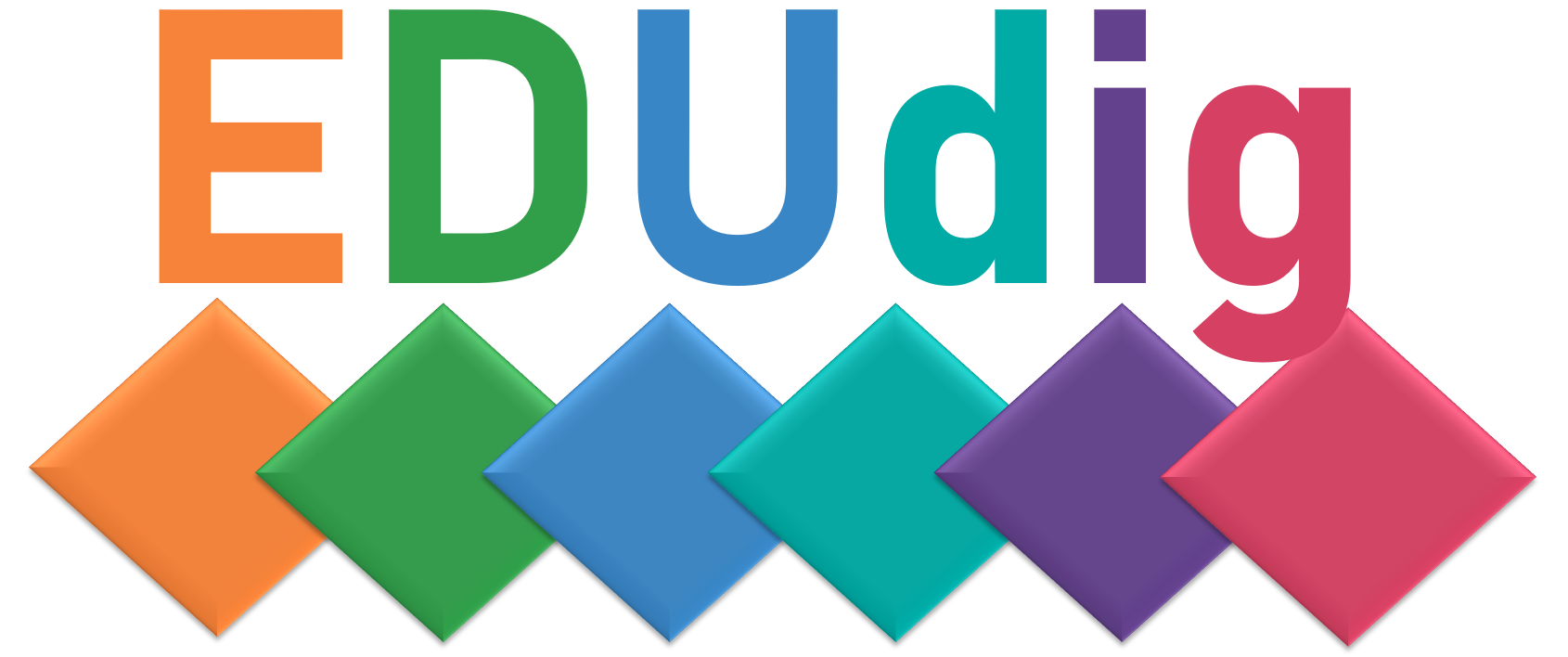EDUdig Erasmus+ Project Closing Conference
24 and 25 April 2023
24 April 2023
EDUdig – First day session
| From 08:30 | Registration |
Building D, 2nd floor |
| 09:00 – 09:20 | Welcome & EDUdig project presentation Adrijana Krebs – FH OÖ |
PC D-204 |
| 09:25 – 10:10 |
Expending the perspective of educational |
PC D-204 |
| 10:10 – 10:25 | Coffee break | SR D-206 |
| 10:25 – 11:55 |
Workshop on “Forming virtual teams for |
PC D-204 |
| 12:00 – 12:45 | Lunch break | SR D-206 |
| 12:45 – 14:15 | Workshop on COIL: an onboarding story Ana Balula, Susana Caixinha – University of Aveiro (PT) |
PC D-204 |
| 14:15 – 14:25 | Coffee break | SR D-206 |
| 14:25 – 15:30 | Conculsion and exchange | SR D-206 |
25 April 2023
EDUdig – joint programme with the Teaching Day
| 8:15 – 9:00 | Registration | Aula Building A |
| 9:00 – 9:15 |
Opening Teaching Day |
HS 1 |
| 9:15 – 9:45 | Keynote Speech: “Future Skills and the Teaching and Learning of Tomorrow”. Professor Dr. phil. habil. Ulf-Daniel Ehlers |
HS 1 |
| 9:45 – 10:00 | Questions and discussion | HS 1 |
| 10:00 – 10:45 | Concept presentations of the FH OÖ Teaching Awards 2022 |
HS 1 |
| 10:45 – 10:55 | Organisational details | HS 1 |
| 10:55 – 11:15 | Coffee break | Aula |
| 11:15 – 11:55 | Parallel tracks (1-4) Check programme Teaching Day |
|
|
– – – – – – – – |
START EDUdig Track |
|
| 11:50 – 12:55 |
Supporting the development of teachers’ and |
SR A-108 |
| 13:00-13:45 | Lunch break | Aula |
| 13:45 – 14:45 | Workshop on Gamified Learning – Play Escape Room Adrijana Krebs, Tanja Peherstorfer |
SR A-107 |
| 14:50 – 16:15 |
Presentation & Workshop “Digital Transformation and |
SR A-107 |
| from 16:15 | Joint together | Aula |
Programme details
The present project (EDUdig) focuses on the structuring and presenting of digital, competence-oriented teaching methods. Drawing from the EU’s framework for Digital Competence Framework for Educators, we have gathered pedagogical concepts, teaching methodologies complemented with educational technology. The aim is to provide teachers with e-learning resources that support them in designing diverse online teaching and enable students to design their digital learning in a collaborative, creative and self-determined way.
This workshop expands upon the project’s findings, inviting participants to reflect on designing diverse teaching settings and supporting students in independent learning.
Take a step with us towards sustainable teaching and use the available expertise to position yourself as an expert in digital continuing education. Benefit from exclusive access to the e-learning resources developed in the project as well as free use of the online seminars developed as part of the project.
Contributer/speaker
 Adrijana Krebs MA ~
Adrijana Krebs MA ~
TOP Lehre and E-Learning, University of Applied Sciences Upper Austria, Campus Linz
 Mag. Tanja Peherstorfer ~
Mag. Tanja Peherstorfer ~
Higher Education Research and Development, University of Applied Sciences Upper Austria, Campus Linz
Engaging students actively is pivotal for a satisfying online learning experience. In order to enable peer learning and successful collaboration in online studies, the educator needs to facilitate virtual team work during the whole learning process. Especially important is to support the very beginning in team formation for ensuring that all team members are included, know the objectives, are getting committed and trust building is initiated. The workshop discusses various needs and settings for forming online teams and provides hands-on opportunities for experimenting with selected online team formation methods.
Contributer/speaker
 Tarja Chydenius, PhD ~
Tarja Chydenius, PhD ~
Senior Lecturer at Laurea University of Applied Sciences, Vantaa, Finland
Collaborative Online International Learning (COIL) is a pedagogical approach using digital media for students to carry out projects/work in international teams. Coupled with concepts such as virtual mobility or internationalisation at home, COIL projects allow the development of intercultural competences (and many others) and are an affordable alternative to democratise the internationalisation experiences of students and faculty. In this workshop some strategies for the structuring and operationalisation of these projects will be addressed, considering aspects that teachers and students identify as more challenging and more successful, highlighting options to avoid and to repeat in future initiatives.
Contributer/speaker
 Ana Balula PhD ~
Ana Balula PhD ~
University of Aveiro, Portugal
 Susana Caixinha MSc ~
Susana Caixinha MSc ~
University of Aveiro, Portugal
21st century teachers play several roles and fulfill various tasks during teaching activity. They have to possess skills and competences to:
- Plan, implement and assess learning at high standards and on the basis of learning outcomes.
- Implement competence-based teaching, reinforce transversal skills of students and expose them into multidisciplinary learning.
- Enable the development of students as active citizens, problem solvers, equipped for life-long learning.
- Apply learner-centred methods providing flexible learning paths and equal opportunities.
- Be prepared to use ICT in teaching, to enable students to use ICT in their learning process and profession related activities, being aware of cybersecurity issues, using the potential of artificial intelligence and learning analytics.
How all these competences can be assessed and developed?
PROFFORMANCE (+) project provides solution for both as it aims to enhance quality of teaching and learning by supporting higher education teachers.
The consortium developed the PROFFORMANCE Assessment tool providing data for multi-level decision making on the quality enhancement of T&L. The tool can be used as a navigator among competences needed for 21st century teachers. The tool evaluates teachers‘performance along 6 thematic areas and 4 EHEA priorities: digitalisation, internationalisation, inclusion and sustainability. The data from self-, peer-, and student assessment can be compared at the platform tool.profformance.eu.
Upon the results, development plans can be elaborated, and as a first step, teachers can browse the teaching excellence database with 130 good practices collected through an international teacher award call: award.profformance.eu.
The tool can be used for complementing existing QA systems, however it serves for European cooperation providing a democratic solution for common QA and teacher assessement as well.
In the workshop participants may get to know PROFFORMANCE project and its products. They may test the assessment tool and discuss how it supports the planning of (self)development plans.
Contributer/speaker
 Szilvia Besze ~ PROFFORMANCE project – Tempus Public Foundation
Szilvia Besze ~ PROFFORMANCE project – Tempus Public Foundation
Csilla Szabó ~ PROFFORMANCE project – Tempus Public Foundation
Although gamification in educational settings is not a novel approach, it is gaining more recognition in academic literature due to its positive impact on learners’ motivation and academic performance. To enhance cognitive engagement and foster a stimulating collaborative atmosphere, an escape room scenario can be employed. The game itself consists of a challenging story which is formulated as a mission. While playing, the learners are engaged in solving various puzzles that lead them to the final clue with which they achieve the mission and are able to escape.
During this workshop, participants will first play a digital escape room game and then develop their own concept for a digital escape room, guided by specific instructions.
Contributer/speaker
 Adrijana Krebs MA ~
Adrijana Krebs MA ~
TOP Lehre and E-Learning, University of Applied Sciences Upper Austria, Campus Linz
 Mag. Tanja Peherstorfer ~
Mag. Tanja Peherstorfer ~
Higher Education Research and Development, University of Applied Sciences Upper Austria, Campus Linz
The presentation assumes that the University is key for Digital Transformation (DT) in society, and educators’ and students’ digital competencies are central for DT in the University. Based on qualitative literature review and a SWOT analysis, the paper identifies reasons for DT being only of limited success in some knowledge societies such as Germany and names weaknesses and threats which the University and its members are facing in this respect. It is then argued that digital competencies developed in the Erasmus+ project EDUdig can help to overcome these weaknesses and tackle the threats. This way, recommendations are suggested for quality literacy in DT of higher education teaching and learning for the dimensions of quality strategy, management, practice and culture. Finally, it is shown that the EDUdig competencies (which are built on the DigCompEdu Framework) are relevant future and all-time skills as they are covering the 17 future skills profiles reported in the literature. This emphasizes once again that the EDUdig competencies for digital transformation play an important central role – inside and outside the university.
Contributer/speaker
 Prof. Dr. Dr. Theodor Leiber ~
Prof. Dr. Dr. Theodor Leiber ~
Scientific Advisor and higher education researcher, Evaluation Agency Baden-Wuerttemberg, Mannheim, Germany

